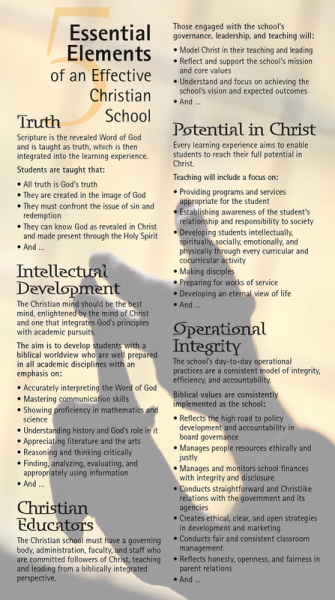Essential Elements of a Christian School
ACSI’s intent is to provide a starting point, a practical framework consisting of five essential elements of Christian Education.
ACSI believes that Christian schools exist to support parents in fulfilling their biblical responsibility to educate children. ACSI’s intent is not to define each school’s philosophy but to provide a starting point, a framework consisting of five essential elements — truth, intellectual development, Christian educators, potential in Christ, and operational integrity — upon which a school can build and implement a philosophy for Christ-centered education.
Building on the framework provides an opportunity for school leaders to reconsider those issues that are fundamental to a school. At the same time, it helps individuals to better understand and finetune their personal philosophy of Christian schooling, calling them back to the core issues that speak to the very reason for the school’s existence.
By examining Scripture, considering the students’ educational needs in light of the school’s present strategies, and depending on the guidance of the Holy Spirit, school leaders can develop a document that will keep our common vision and mission in focus while clearly delineating the distinctive characteristics of each school.
Essential Elements of a Christian School:
TRUTH: Scripture is the revealed Word of God and is taught as truth, and that truth is integrated into the learning experience.
Students are taught that all truth is God’s truth, they are created in the image of God, they must confront the issue of sin and redemption, they can know God as revealed in Christ and made present through the Holy Spirit...
INTELLECTUAL DEVELOPMENT: The Christian mind should be the best mind, being enlightened by the mind of Christ and having integrated God’s principles with academic pursuits.
The aim is to develop students with a biblical worldview who are well-prepared academically with an emphasis on accurately interpreting the Word of God, mastering communication skills, showing proficiency in mathematics and science, understanding history and God’s activity in it, appreciating literature and the arts, reasoning and critical thinking, finding, analyzing, evaluating, and appropriately using information...
CHRISTIAN EDUCATORS: The Christian school must have a board, administration, faculty, and staff who are committed followers of Christ, teaching and leading from a biblically integrated perspective.
School personnel must strive to model Christ in their teaching and leading, understand and focus on achieving the school’s vision and expected outcomes, reflect and support the school’s mission and core values...
POTENTIAL IN CHRIST: Every learning experience aims to engage students toward their full potential in Christ.
Learning will include a focus on providing programs and services appropriate for the student, establishing awareness of the student’s relationship and responsibility to society, developing students intellectually, spiritually, socially, emotionally, and physically through every curricular activity, making disciples, preparing for works of service, developing an eternal view of life...
OPERATIONAL INTEGRITY: The school’s day-to-day operational practices are a consistent model of integrity, efficiency, and accountability.
Biblical values are consistently implemented as each school Rreflects the high road to policy development and accountability in board governance, manages people resources ethically and justly, manages and monitors financial issues with integrity and disclosure, conducts straight forward and Christlike relations with the government and its agencies, creates ethical, clear, and open strategies in development and marketing, conducts consistent and fair classroom management, reflects honesty, openness, and fairness in parent relations...


